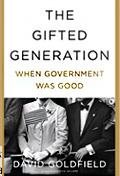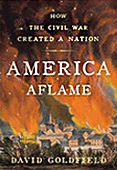


"An American history that serves as a
heartfelt plea for a revival of socially responsible leadership."
“Goldfield traces the arc of his own baby boomer generation in this solid survey of postwar America. . . . [I]t’s replete with nicely wrought sketches of well- and lesser-known figures.
The book’s strengths are its measured tone, lively prose, and comprehensive coverage.”

“I would give this book six stars if I could.
This book re-arranged my molecules."
Amazon review

"A superb, stylishly written historical synthesis that insightsfull foregrounds ideology, faith, and public mood…
an ambitious, engrossing interpretation with new things to say about a much-studied conflagration."
Starred
review
“masterly synthesis of political, social,
economic, and religious history”
“Most history books try to explain the past.
The exceptional ones, of which "America Aflame”
is a distinguished example, remind us that the past
is ultimately as inscrutable as the future.”
READ THE WHOLE REVIEW
"a monumental new appraisal of the war"
Starred
review
A provocatively written,scrupulously researched and well-framed consideration of evangelical religion´s questionable role in the antebellum, Civil War, and Reconstruction periods of our history.
An important book as the war´s sesquicentennial approaches."
" a riveting, comprehensive and delightful piece of histrical writing…"he is a wonderful storyteller with a facile, compact prose style that transforms complex historical ingredients into a savory meal. While not skimping on details, he doesn´t allow the reader to get lost in them either."

Starred
review
Not just a reappraisal of the Civil War, but
an exemplary cultural study of 19th-century
America.The author offers an intriguing new
perspective on what he convincingly argues
to be not only the defining event of 1800s
America, but defining event of our nation's
entire political and cultural history. For Goldfield,
evangelical politics drives nearly every facet of
the historical machinations of the period.
Throughout the narrative, evangelicalism informs
the debates around abolition, the Antebellum
cultural conflicts born of large-scale immigration,
territorial expansion and the rural religious fervor
that led to the first cannon blasts at Fort Sumter.
Although Goldfield is not the first to consider
religion as a leading element in the Civil War, he
elevates its influence by exploring the permeation
of nearly every facet of American cultural life by
religious thought. His unrelenting attention to so
many of America's early cultural crannies—
literary, technological, even geographical—often
overlooked by past histories creates an authoritative
depth to his argument. For many writers, trading in
such detail might complicate the otherwise simple
arguments. However, because Goldfield writes with
such veteran grace, he effectively demonstrates the
complexity of the Civil War, with divisions that still
reverberate in our modern political discourse.
“Goldfield argues compellingly that wise and dedicated politicians can use the power of the federal government to change and dramatically improve our society…This work reminds us that government action
can be widely beneficial.”
"President Ronald Reagan famously insisted that 'government is not the
solution to our problem; government is the problem.' David Goldfield's
gracefully written The Gifted Generation is a bracing reminder that the
first three presidents after Franklin Roosevelt demonstrated in concrete
ways that an activist government did have a critical and positive role to
play in improving the lives of Americans, black and white, poor and middle class. Dan T. Carter,
author of The Politics of Rage
"Activist government has been so demonized that we forget how much the federal government did to create the broad and prosperous middle class that led our nation to (yes) greatness after World War II.
David Goldfield cures our amnesia with a sparkling, sweeping and deeply engaging account of an era 'when government was good' because so many Americans recognized the good that it did. May The Gifted Generation change this generation's view of the progress that is possible."
- E.J. Dionne Jr,
author of Our Divided Political Heart
"David Goldfield blends solid scholarship with eloquent writing to argue that dynamic federal leadership was last practiced by activist presidents, 1945-68. He deserves particular credit for recognizing Dwight Eisenhower's contribution, so shamefully neglected by historians. Goldfield skillfully
reminds us that the continuing issue is not big or small government but 'good government.' " - David A. Nichols,
author of Ike and McCarthy